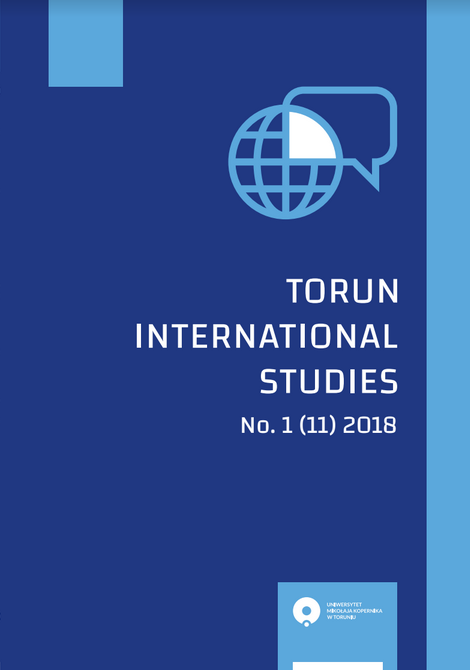POLAND'S NATIONAL SECURITY POLICY IN A NEW REGIONAL SECURITY ENVIRONMENT. CASE STUDY: NATIONAL SECURITY STRATEGY OF POLAND (2014)
DOI:
https://doi.org/10.12775/TIS.2018.008Abstract
Military aggression launched by Russia against Ukraine was a turning point on the international arena; and particularly in Europe. The Russian aggression against Ukraine, concluded by the illegal occupation and annexation of the Crimean Peninsula represented the first postCold War event in which one state claimed – equipped with the full array of force – a territory belonging to another state, whose borders are recognised under the international law. Russian aggression triggered a general concern in Eastern Europe. The Polish leaders were among the first European officials who vehemently condemned the actions taken by Russia. This paper aims to explore Polish stance on Russian military aggression against Ukraine and how the Polish leadership posture is reflected in the new concept of the national security strategy. Thus, we focus on the National Security Strategy of Republic of Poland (2014). The case study is structured on two levels of analysis that help us understand the context in which Polish national security strategies and policies have been formulated throughout last years. On the one hand, national security strategies and foreign policy priorities have been formulated in accordance with the status of membership within North Atlantic Alliance (and the European Union). On the other hand, the sense of insecurity originating from its eastern borders and particularly negative historical experiences and tense relations with the Russian Federation under the Putin regime have been taken into consideration in the formulation of national security strategies and Policie.References
Baldwin, D. (1997). The concept of security. Review of International Studies, 23, pp. 5-26.
Bienek, P. (2006). Polish Defense Policy in the Context of National Security Strategy. Naval Postgraduate School.
Binnendijk, H. (2015). Deterring Putin’s Russia. In R. Kupiecki & A. A. Michta (Eds.), Transatlantic Relations in a Changing European Security Environment (pp. 21-29). Warsaw / Washington D.C.: Drukarnia Wydawnictw Specjalnych Sztabu Generalnego WP.
Buckley, N., Khan, J.F., & Cienski, J. (2014, April 1). Poland calls for NATO troops deployment. Retrieved April 16, 2017 from https://www.ft.com/content/3867c08a-b999-11e3-b74f-00144feabdc0
Buzan, B. (1981). People, States and Fear. United Kingdom: Wheatsheaf Books Ltd.
Buzan, B. (2011). Securitatea – un nou cadru de analiza. Cluj-Napoca: CA Publishing.
Ghica, L., & Zulean, M. (2007). Politica de Securitate Națională: concept, instițutii, procese. Bucharest: Polirom.
Hermann, F.C. (1971). Defining National Security. Retrieved November 12, 2016 from http://www.voxprof.com/cfh/hermann-pubs/Hermann-Defining%20National%20Security.pdf
Kacprzyk, A. (2015). U.S. Military Presence in Central and Eastern Europe: Consequnces for NATO Strategic Adaptation, Deterrence and Allied Solidarity. The Polish Institute of International Affairs.
Kennan, F.G. (1985). Morality and Foreign Policy. Foreign Affairs, 64(2), pp. 205-218.
Kupiecki, R., & Michta, A.A. (2015). Introduction and Executive Summary. In R. Kupiecki & A. A. Michta (Eds.), Transatlantic Relations in a Changing European Security Environment (pp. 7-20). Warsaw / Washington D.C.: Drukarnia Wydawnictw Specjalnych Sztabu Generalnego WP.
Kupiecki, R., & Michta, A.A. (2015). The Security Dilemmas Facing Central and Eastern Europe, NATO, US and Transatlantic Security Relations. In R. Kupiecki & A.A. Michta (Eds.), Transatlantic Relations in a Changing European Security Environment (pp. 68-79). Warsaw / Washington D.C.: Drukarnia Wydawnictw Specjalnych Sztabu Generalnego WP.
Missala, A.B. (2016). Poland’s Foreign ans Security Policy: main directions. UNISCI Journal.
Morgenthau, J.H. (1949). National Interest and Moral Principles in Foreign Policy. The American Scholar, 18(2), pp. 207-2012.
National Defense Strategy of the Republic of Poland. (2009). Warsaw. Retrieved June 17, 2017 from https://www.files.ethz.ch/isn/156791/Poland%202009.pdf
National Security Strategy. (2014). Warsaw. Retrieved June 17, 2017 from https://www.bbn.gov.pl/ftp/dok/NSS_RP.pdf
Nowak, M.J. (2010). Poland’s Security Policy in a Unstable World. Nacao e Defensa, 125, pp. 33-48.
O’Donnell, C.M. (2012). Poland’s U-Turn on European Defence: a Missed Opportunity. Center for European Reform. Policy Brief.
Phillip, A.K., & Phillip, A.P. (2016). The Eastern Front in NATO Strategy – End of Interregnum. In K. Redlowska & J.A. Larsen (Eds.), NATO. Rethinking. Realign. React. Tackling Security Challenges Together (pp. 31-44). Warsaw: IPRESS Studio.
Poland’s new president calls for stronger NATO presence to counter Russia (2015, August 6). Warsaw. Retrieved April 16, 2017 from https://www.theguardian.com/world/2015/aug/06/poland-president-andrzej-duda-stronger-nato-presence-counter-russia
Polish Foreign Policy Priorities 2012-2016. (2012, March). Retrieved June 18, 2017 from http://www.msz.gov.pl/resource/d31571cf-d24f-4479-af09-c9a46cc85cf6:JCR
Ullman, R. (1983). Redefinind Security. International Security, 8(1), pp. 129-153.
Wolfers, A. (1952). “National Security” as an Ambiguous Symbol. Political Science Quarterly, 67(4), pp. 481-502.
Downloads
Published
How to Cite
Issue
Section
Stats
Number of views and downloads: 403
Number of citations: 0



